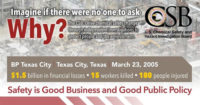EHS professionals can raise their profiles within their company by transforming themselves into what John McBride calls, safety business partners. “I’m not talking about a title,” said McBride, SPHR, of Consentium Search in Wesley Chapel, Florida. “We’re talking about a role, a level of participation.”
McBride spoke at Safety 2015 on the business partner, who invests time, knowledge and expertise in a company in order to get a piece of the pie. Safety leaders design safety strategies, but business partners actually participate in establishing a business strategy. “They’re in it from the beginning.
“Safety touches every employee in the company – or it should. Safety can and should see itself as the centerpiece of the company.”
McBride recommended that safety pros focus on making the company better – on maximizing operational efficiency and profits. Such efforts will not only help them do their job better. They may also rise within the company.
How to do it
Change yourself and others, in four major areas:
- Knowledge
- Accomplishments or achievements
- Communication
- Leadership
Knowledge
Most safety professionals have the technology knowledge they need to do their jobs, but only 33.9 percent have college degrees. “To be taken seriously as a business partner, you need to have your degree,” said McBride, who pointed out that 98.1 percent of Fortune 1000 CEOs have degrees. If you already have a BA in safety, consider getting an MBA.
Certification is also important. “Get certified. If you don’t get certified, people outside your profession don’t know how good you are. Certification means you have been tested by a third party. They are certifying that you know what you’re talking about.”
Degrees and certifications may help you get a promotion. “It doesn’t guarantee you’ll get the job, but it’ll give you a leg up.”
McBride said he is always surprised by safety practitioners who allow their certification to expire because their company won’t pay the renewal fee. “Whose career is it? Yours or theirs?”
Expanding your business knowledge is also helpful. Know – or learn – about the stock market, competition, balance sheets, sales, profit margins. Take classes or join committees or organizations that will help you build your knowledge and skills. Know your company’s EBITA (Earnings before Interest, Taxes and Amortization).
However, knowledge is not power. Application of knowledge is power.
Achievements
“Safety people are not good about talking about their accomplishments,” McBride said. To get good at it, you need to be able to quantify those achievements, and the metrics need to be translated into the language of business: money, productivity and profitability.
In order to promote yourself in a diplomatic way, says McBride, use the word “we” instead of “I” when announcing accomplishments, but “take credit where credit is due.”
Communication. Common sense is based on common knowledge and experience. Don’t get frustrated if someone without that knowledge and experience doesn’t understand what you’re trying to say. Also, “It doesn’t matter what you say, it matters how you say it.”
Pre-formed ideas can impede understanding. Besides speaking and listening, communication also includes a nonverbal component. “Be aware of body language,” advised McBride. “Think before you respond. If you have your response ready when you’re finished speaking, then you weren’t listening.”
Learn to speak in the language of management: money, metrics, cost-benefit analyses. When you are making a case for spending money on safety, be prepared to tell how much money it will save and how many injuries it will prevent. Do a probably risk analysis. “Like it or not,” says McBride, “there is a value placed on everything, from our limbs to our lives.”
Leadership.
There are a few things that tie leadership together, according to McBride:
- Vision
- Plan of action
- Engage the right people
- Win people over
- Face adversity with courage
- Develop other leaders




